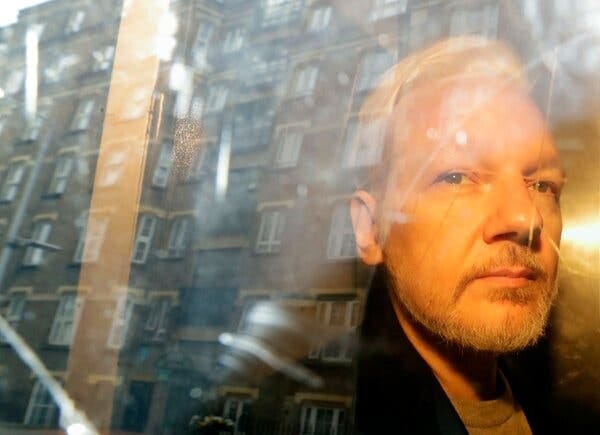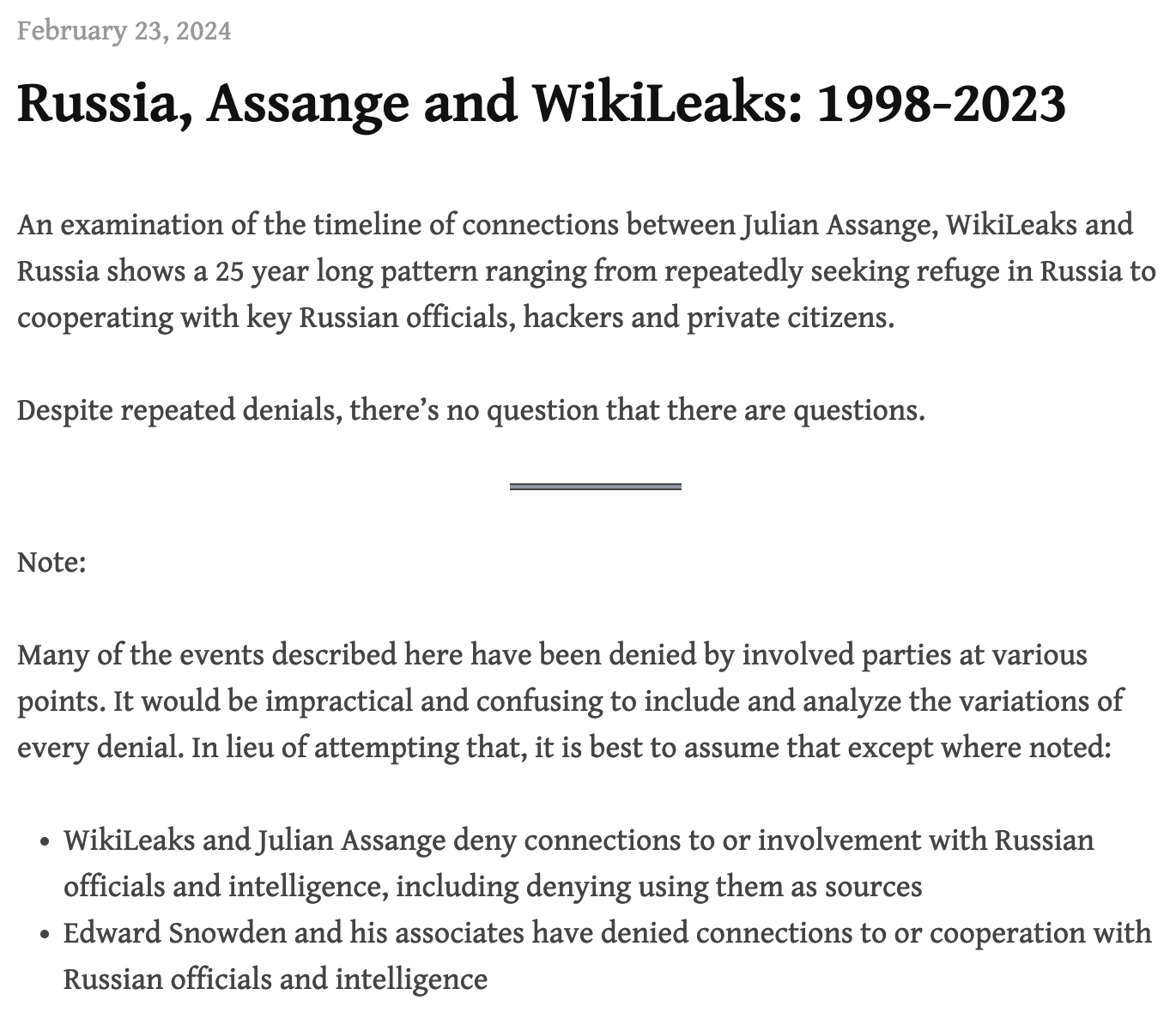Julian Assange: Journalist, or Russian Asset?
Review the facts–decide for yourself.
Low on time? Listen to a 10m podcast discussion about this topic:
Few figures have proved as mysterious as the mastermind behind the whistleblowing website WikiLeaks, Julian Assange.

Once hailed as a champion of transparency and a fearless defender of the public's right to know, Assange now finds himself the subject of a damning analysis by Emma Best, a researcher and co-founder of the DDoSecrets group. Best's findings suggest that Assange may have been less a crusader for truth and more a pawn in Russia's grand geopolitical game, acting more like a state-sponsored asset than a guardian of the free press.
Emma Best's meticulously researched timeline, spanning over two decades, lays bare a pattern of behavior that raises serious questions about Assange's true allegiances among those who value factual integrity.

From his early plans to seek refuge in Russia to his collaboration with dubious intermediaries linked to Russian intelligence, Assange's actions clash in obvious ways with the core tenets of journalistic ethics. The timeline indicts Assange's increasingly close relationship with Russia, painting a picture of a man deeply entangled in the machinations of a foreign power engaged in aggressive global information warfare–and I strongly suggest you read it.
Perhaps most damning are the instances of selective disclosure and strategic timing of leaks which consistently align with Russian interests. The omission of emails about Russia in WikiLeaks' 2012 data dump, the conspicuous withholding of damaging info about Russia in 2016, and the curiously timed release of the "Spy Files Russia" in 2017 all suggest an editorial agenda shaped far more by Moscow's priorities than by an ethical commitment to impartial truth telling.
Assange's role in facilitating Edward Snowden's escape to Russia in 2013 further complicates the picture. While the full extent of coordination between Snowden, WikiLeaks, and Russian intelligence continues to remain shrouded in secrecy, all available evidence points to a level of collaboration which far stretches the boundaries of legitimate journalistic practice, to put it politely.
Equally troubling is Assange's persistent lack of transparency about WikiLeaks' ties to Russia, even as the evidence of such connections mounts. This evasiveness, coupled with the pattern of actions that consistently benefit Russian interests, paints a portrait not of a journalist speaking truth to power, but of an actor willingly or unwittingly advancing the agenda of a foreign state.
Best's analysis deconstructs the myth of Assange as an impartial journalist, revealing instead a figure whose actions bear the hallmarks of a Russian intelligence asset. The selective disclosure of data, the strategic timing of leaks, and the association with Russian linked intermediaries all fit the modus operandi of a state directed influence operation.
This is not to say that WikiLeaks has never served the public interest.
The organization's early exposés undoubtedly shed light on critical issues and sparked important debates about government transparency. However, the mounting evidence suggests that along the way, Assange's mission became compromised, his independence eroded by a growing alignment with Russian state interests, and perhaps resources.
When grappling with the implications of these findings, we are forced to confront uncomfortable questions about the nature of journalism in this time of digitized global information warfare.
When does a purported champion of transparency become a tool of state propaganda? When does the selective disclosure of information cease to be journalism and start to resemble something more akin to espionage?
Based on the evidence, the inclusion of Assange among the ranks of journalists persecuted for their commitment to the truth appears increasingly misguided. While his wife, Stella, has tirelessly campaigned to portray him as a political prisoner, a victim of a vindictive state apparatus bent on silencing a brave whistleblower, the reality appears far more complex and troubling.
There is no denying that Assange's prolonged imprisonment and the circumstances surrounding his extradition raise serious concerns about due process and the treatment of people accused of crimes. The lack of transparency in the legal proceedings against him points towards a flawed system.
However, to conflate these legitimate grievances with an ethical or moral defense of Assange's journalistic integrity is to ignore the pile of evidence of his ties to Russian state interests.
From his early flirtations with Russian exile to his later collaborations with dubious intermediaries linked to Russian intelligence, Assange's trajectory suggests a man increasingly entangled in a complex geopolitical web. His selective disclosure of information, strategic timing of leaks, and consistent alignment with Russian objectives all paint a picture of someone who, at best, allowed his own ego and ambition to cloud his judgment and, at worst, rapidly became a willing tool of Moscow's propaganda machine.
It appears that U.S. government lawyers got it right when they recently argued the same in a London court in favor of his extradition to face charges in the U.S.:
Dobbin added that in encouraging Manning and others to hack into government computers and steal from them, Assange was “going a very considerable way beyond” a journalist gathering information.
Assange was “not someone who has just set up an online box to which people can provide classified information,” she said. “The allegations are that he sought to encourage theft and hacking that would benefit WikiLeaks.”
The U.S.’s charges against him, including conspiracy to receive national defense information, obtaining national defense information, disclosure of national defense information, and conspiracy to commit computer intrusion, collectively carry a maximum sentence of 175 years in prison if he is convicted on all counts (per NYT, the U.S. has provided recent assurances Assange would not face the death penalty).
In this light, Stella Assange's efforts to cast her husband as a martyr for press freedom, while understandable on a personal level, risk obscuring these more troubling aspects of his story.
On April 16, Mrs. Assange said,
“The diplomatic note does nothing to relieve our family’s extreme distress about his future — his grim expectation of spending the rest of his life in isolation in U.S. prison for publishing award-winning journalism,” she said in a statement. “The Biden Administration must drop this dangerous prosecution before it is too late.”
In fact, he is not being charged with publishing award-winning journalism, but with a litany of crimes under the Espionage Act.
By conflating the legitimate concerns about his treatment with a defense of his compromised journalistic credentials, Mrs. Assange actively undermines the very principles of transparency and accountability Assange himself once claimed to champion.
Here are some handy questions we should be asking ourselves when constructing a mental model for analyzing the government’s actions:
Do we like that countries often cooperate to handle and prosecute criminals?
Generally, yes, because ignoring transnational crime has negative ramifications for public safety and national security.
Do we agree that journalists should not engage in deeply close relationships with or accept resources from individuals associated with state intelligence apparatuses while simultaneously claiming to be reporting on them impartially?
Most people would agree they should not. Journalism is a particular profession with its own guiding ethical principles. While wearing a mask of journalism while engaging in espionage is not unique in history, press freedom organizations would strongly prefer governments not do it!
Do we agree journalists should not encourage or engage in the commission of crimes in the course of their reporting?
Most people would agree they should not.
Do we believe governments should be able to prosecute individuals who are citizens of other countries who have committed major crimes against their country?
Again, ignoring transnational crime would appear to be a mistake, and the idea of transnational cooperation between nations to help bring alleged harmful elements of society to justice sounds a lot like the right thing.
As the world watches Assange's legal battles unfold, it seems likely the full truth, obscured by layers of secrecy and subterfuge, might never be fully revealed. Yet one conclusion seems inescapable: that his legacy, irrespective of whatever comes next, has been tainted by the persistent specter of Russian influence.
Assange’s story offers a reminder of the perils that await those who might seek to challenge the status quo without first investigating the purity of their own motives and the integrity of their own alliances. It is a cautionary tale about the ease with which noble ideals can be subverted, and how the pursuit of transparency can be weaponized to serve the interests of the very powers it seeks to expose.
In the end, the tragedy of Julian Assange may not be that he sought to speak truth to power, but that in doing so, he ultimately became entangled in a web of deceit and compromised by the very forces he once claimed to oppose.

